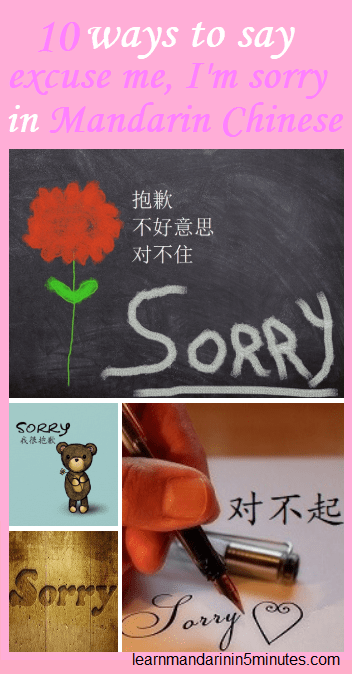Excuse me, I am sorry is a very commonly used phrase in any languages. If you are a person like me, who is always making mistakes, you will use this phrase at least a dozen times a day.
When you first begin to learn Mandarin Chinese, I am sorry, 对不起, will surely be one of the first few Chinese phrases you will learn or pick up. In order to expand your Chinese vocabularies, we will teach you how to use this phrase in different situations. From the following dialogues, you will learn how to utilize this Chinese phrase, 对不起, and learn new Chinese expressions at the same time.

Excuse me, let me pass in Mandarin Chinese
Dialogue 1 is a conversation between Peter and another passenger on a bus. The bus is very crowded and Peter is trying to get off.
彼得: 对不起,请问您下车吗?Duì bù qǐ, qǐng wèn nín xià chē ma?
Excuse me, are you getting off the bus?
男士: 不下。Bù xià
No.
彼得: 劳驾,让一下。我要下车. Láo jià, ràng yī xià. Wǒ yào xià chē
Excuse me, let me pass. I am getting off.
From this dialogue, instead of using 对不起, you can use 劳驾. 劳驾 is a very commonly used phrase in Beijing. When you need help, when you borrow something, and or when you want someone to make way, you can say 劳驾. This is a very polite way to ask or request for help in Beijing.
I’m very sorry, it’s my fault in Mandarin Chinese
Continuation from Dialogue 1 , Peter got off the bus and ran towards the restaurant. As he was in a hurry, he did not see a man in front and bumped into him.
男士: 走路也不看着点儿 (著點兒)。 Zǒu lù yě bù kàn zhuó diǎnr. Why don’t you look where you are going?
彼得:不好意思。Bù hǎo yì si. Sorry.
我很抱歉。Wǒ hěn bào qiàn. I am very sorry
You can use 不好意思,
1. When you interrupt someone to ask a question / or ask for permission
不好意思,我可以在这儿抽烟吗?Bù hǎo yì si, wǒ kě yǐ zài zhèr chōu yān ma
Excuse me, may I smoke here?
不好意思,请问车站在哪儿?Bù hǎo yì si, qǐng wèn chē zhàn zài nǎ’er
Excuse me, may I know where is the station?
2. When you receive a gift
不好意思 in this context is like saying “you shouldn’t have” or “ there is no need” in English.
3. A form of apology
This is a polite form of apology when you are late for an appointment or when rejecting an invitation.
不好意思,我迟到了。Bù hǎo yì si, wǒ chí dào le. I’m sorry for being late.
不好意思,我不能参加你的生日会。Bù hǎo yì si, wǒ bù néng cān jiā nǐ de shēng rì huì. Sorry, I can’t attend your birthday party.
不好意思 has the meaning of feeling embarrassed. You feel embarrassed for accepting a gift which you think you don’t really deserve; for disturbing someone; and for not being able to attend someone’s party when he/she has sent the invites especially for you.
I beg your pardon in Mandarin Chinese
Peter rushed into the restaurant and saw his friend waiting. As he was still gasping for breath, he did not pay attention to what his friend was asking.
彼得:不好意思,迟到了。Bǐdé: Bù hǎo yì si, chí dào le. Sorry to be late
朋友:没事儿的。Péngyǒu: Méi shì er de. It’s alright.
朋友:最近忙吗?Péngyǒu: Zuì jìn máng ma? How have you been?
彼得:对不起,没听清。Bǐdé: Duì bùqǐ, méi tīng qīng. I beg your pardon.
The literal translation of 没听清 is did not listen clearly. You can also say
对不起,没听清楚。请再说一遍。Duì bù qǐ, méi tīng qīng chǔ. Qǐng zài shuō yī biàn.
I beg your pardon. Please say it again. (對不起,沒聽清楚,請再說一遍)
Traditional Chinese
彼得:不好意思,遲到了。
朋友:沒事兒的。
朋友:最近忙嗎?
彼得:對不起,沒聽清。
Related phrases – I am sorry in Mandarin Chinese
对不起,打扰您一下。Duì bù qǐ, dǎ rǎo nín yī xià. Sorry to bother you.
对不起,麻烦一下。Duì bù qǐ, má fan yī xià. Sorry, could I trouble you to..
对不起,都是我的错。Duì bù qǐ, dōu shì wǒ de cuò. Sorry, it’s all my fault.
抱歉,给您添麻烦了。Bào qiàn, gěi nín tiān má fan le. Sorry to trouble you.
不好意思,我弄错了。Bù hǎo yì si, wǒ nòng cuò le. I’m sorry, I got it wrong.
对不起,见笑了。Duì bù qǐ, jiàn xiào le. Sorry for making a fool of myself.
对不起,我不是故意的。Duì bù qǐ, wǒ bù shì gù yì de. I’m sorry. I did not mean it.
对不住了。Duì bù zhù le. I’m sorry.
对不起,请原谅。Duì bù qǐ, qǐng yuán liàng. I’m sorry, please forgive me.
这事儿怨我 Zhè shì er yuàn wǒ. It’s my fault. I should be blamed.
Traditional Chinese
對不起,打擾您一下。
對不起,麻煩一下。
對不起,都是我的錯。
抱歉,給您添麻煩了。
不好意思,我弄錯了。
對不起,見笑了。
對不起,我不是故意的。
對不住了。
對不起,請原諒。
這事兒怨我。
对不起,见笑了 is commonly used when you do something silly or embarrassing in front of others. The 见 does not mean look but rather 被 be laughed at. It is used as a modest word to show the speaker is embarrassed of what he has done or said. For example,
我唱歌唱得不好,见笑了。Wǒ chàng gē chàng dé bù hǎo, jiàn xiào le. My singing is bad, please don’t laugh.
对不住 means sorry when you have let someone down. It is a Chinese phrase you would normally use on someone you know and not on strangers. In my opinion, it is more colloquial than 对不起. I am sure you have heard this Chinese phrase used many times in Cantonese dramas.
Cultural tips
Have you heard of this Chinese phrase “见外 jiàn wài ( regards someone as a stranger)“? This phrase has a deep root in the Chinese culture. To the Chinese, people in the family are considered as 自己人 Zì jǐ rén(own people), and the rest are 外人 wài rén ( outsiders). The treatment between own people and outsiders are very clear in Chinese culture. With intimate friends, they can talk casually without paying much attention to courtesy. Whereas, when they are with strangers, they are very polite and careful of how they behave and talk.
Now that you have learned 10 different ways to say I am sorry ( as an apology or for getting someone’s attention), we hope you know how to use them correctly after this lesson.